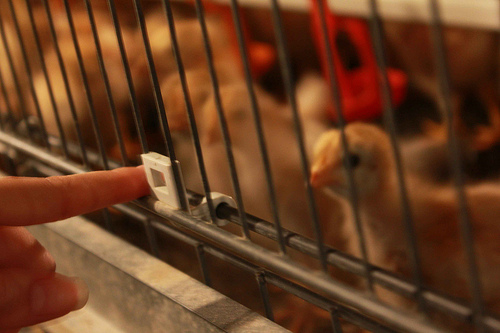Recent comments
Aenean nonummy hendrerit mauris. Phasellus porta.
- jenn on The Best Ever Egg Salad
- Dora Friedli on The Best Ever Egg Salad
- jenn on The Penny Prayer
- jenn on Resurrection
- Dora Friedli on The Penny Prayer
Keeping Small Flocks Free from Salmonella

With the recent recall of more than 500 million eggs fresh in our minds the debate over caged or free range hens still rages on. Most in the industry still insist that raising hens in small confined cages is actually better and safer for them. Just this year, the United Egg Producers, a leading U.S. egg industry trade group, announced that caging hens is better for food safety. But not all industry groups agree. In fact, the U.K. egg industry takes a completely opposite view. Nine studies have been conducted throughout the U.K. over the past five years, and all report that egg operations where hens are caged have a higher incidence of salmonella. The studies were so convincing that the U.K. has adopted new legislation making it illegal to cage hens anywhere in the U.K., which begins in 2012.
The U.S., however, stands strong in its conviction that caged eggs are safer. But, that stance is starting to waiver. California Governor Arnold Schwarzenegger signed state legislation to ban caged hens by 2015, and many food outlets, such as Wal-Mart, Safeway, Burger King, Wendy’s and Subway, have committed to decrease the number of caged-hen eggs purchased.
In all my years of raising hens I have never caged my hens. But, with all the reports and studies and information out there I have to wonder…Do I need to worry about salmonella? Does the fact that hens run free let backyard enthusiasts and small farm flocks off the hook? Not at all!! Every study performed in the U.S. and the U.K. found other factors contribute to the incidence of salmonella besides keeping birds in cages.
Veterinarians, poultry experts and poultry inspectors have all reported cases of salmonella in flocks of differing sizes and types, including those raised free-range and organically. Even small flocks need to take steps to lower their chances of contracting salmonella.
But, how can small-flock owners do that? By practicing small flock biosecurity measures.
Salmonella is transmitted among chickens through contact with fecal matter from infected birds or other animals. Most often it’s carried from flock to flock on the clothes and shoes of farm visitors or poultry caretakers. It’s important to restrict visitors to your flocks to limit the chickens’ potential for exposure.
Salmonella is fairly resilient and long-lived. Trucks and other vehicles that might carry the bacteria from another facility should be routed away from chicken houses and paths that caretakers might use so it’s not picked up on shoes or boots.
Rodents, like mice and rats can also spread salmonella between coops. It’s important to keep the chicken feed in sealed containers. If you feed hens outside, bring the food in at night and store it in rodent-proof areas. Keep coops in good condition and well-ventilated with tight construction to prevent mice from entering. Also eliminate weeds and piles of debris that attract rodents in the chicken yard.
Clean coops can also lower the potential of contracting salmonella. Remove manure and wet, soiled litter often. Clean waterers and feeders regularly. Hanging waterers and feeders can help prevent chickens from defecating in them or throwing dirt into them. Regularly disinfect equipment even if you don’t plan to use it for a while.
Vaccinating your flock is the surest way to prevent salmonella. However, in the U.S., vaccines are sold in vials with thousands of doses to accommodate factory farms. This makes is hard for small flock owners. Bud Wood, from Murray McMurray Hatchery, talked briefly about the dilemma of vaccinating for small flocks and although bringing small scale farmers together to vaccinate at the same time is an option it must be carefully coordinated to ensure viability of the vaccine. Watch for updates in vaccination distribution, and encourage veterinarians and legislators to make small quantities of the salmonella vaccine available to small-flock farmers.
The last line or maybe the first line of defense in keeping eggs safe to eat is keeping nesting boxes clean and filled with fresh litter. Collect eggs often, especially in warm weather and storing immediately at 45 degrees F. Eggs that are seriously covered with manure, cracked or leaking should be discarded. To be completely safe, cook eggs so that the yolk is solid and the whites are firm.
To learn more about egg safety and food safety check out these helpful sites.
I just found your site while looking for suburban homesteading blogs, and I wanted to thank you for all the wonderful information on your site. Posts like this, in particular, are so helpful!
My husband and I are just starting to consider leaving metropolitan-suburbia for something a little quieter, like what we had when we were kids. Not the boonies, per se – just a small homestead on the outskirts of a small, quiet city. We’ve been thinking about it for a while, but for some reason it seems more important now than it has in the past. We want to go off the grid for environmental reasons, build a sustainable home, and hopefully learn how to garden and raise a few animals, like chickens.
Thanks for the knowledge, inspiration, and encouragement 🙂